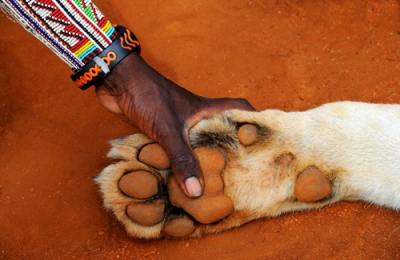 African lions are one of the most charismatic species on the planet. Images of the King of the Jungle are etched deeply into our collective conscience. The debate on how best to conserve lions has been stirred anew with a recent Twitter post by TV hostess Melissa Bachman who killed a “trophy” lion while on safari in Africa. The image of a rifle-toting Bachman posing over the carcass of a dead lion offended activists and animal lovers alike. However, Twitter hype aside, the hunting/conservation of African lions is a controversial topic that begs a thorough understanding of the facts.
African lions are one of the most charismatic species on the planet. Images of the King of the Jungle are etched deeply into our collective conscience. The debate on how best to conserve lions has been stirred anew with a recent Twitter post by TV hostess Melissa Bachman who killed a “trophy” lion while on safari in Africa. The image of a rifle-toting Bachman posing over the carcass of a dead lion offended activists and animal lovers alike. However, Twitter hype aside, the hunting/conservation of African lions is a controversial topic that begs a thorough understanding of the facts.
In 2011 US Fish & Wildlife Service (FWS) was petitioned by animal rights activists to add African lions to the Endangered Species list, sharpening the divide of an already philosophically polarized conservation community. Contradicting the underlying premise of the petition, at a recent lion workshop hosted by FWS, three experts on African lions agreed that the lion, in their opinion, is not currently in danger of extinction. The International Union for Conservation of Nature (IUCN), the central body in conservation for the African lion, currently lists lions as “vulnerable” on their Red List of Threatened Species.
All agree that populations of lions have declined significantly. According to a study authored by Professor Stuart Pimm of Duke University in 2012, about 75 percent of Africa’s savannahs and more than two-thirds of the lion population once estimated to live there have disappeared in the last 50 years. There are likely between 32,00 and 35,000 free ranging lions on the African continent today. According to professor Pimm, “massive land-use change and deforestation, driven by rapid human population growth” is the primary reason for the decline of the lion.
 Sixty percent of all lions harvested in Africa are destined for trophy rooms in the United States. Proponents of an Endangered Species listing claim the issue is a “no brainer.” Allowing hunters to harvest lions and export trophies back to the US sends the wrong conservation message. They say lions would be best conserved by blocking access to American hunters, thereby reducing pressure on lion populations. Jeff Flocken of the International Fund for Animal Welfare (IFAW), the group spearheading the petition to list lions on the Endangered Species Act (ESA), wrote, “Why should anyone spend money to protect an animal that a wealthy American can then pay to go kill?” Mr Flocken characterizes his argument as common sense, but acknowledges that, habitat loss and human-lion conflict, not hunting, are the primary causes of the lions’ disappearance from Africa.
Sixty percent of all lions harvested in Africa are destined for trophy rooms in the United States. Proponents of an Endangered Species listing claim the issue is a “no brainer.” Allowing hunters to harvest lions and export trophies back to the US sends the wrong conservation message. They say lions would be best conserved by blocking access to American hunters, thereby reducing pressure on lion populations. Jeff Flocken of the International Fund for Animal Welfare (IFAW), the group spearheading the petition to list lions on the Endangered Species Act (ESA), wrote, “Why should anyone spend money to protect an animal that a wealthy American can then pay to go kill?” Mr Flocken characterizes his argument as common sense, but acknowledges that, habitat loss and human-lion conflict, not hunting, are the primary causes of the lions’ disappearance from Africa.
“As human-lion contact increases, so does human-lion conflict, resulting in reductions in lion numbers (through poisoning, trapping and shooting) and lack of support for lion conservation among local communities.” ~ IUCN SSC Cat Specialist Group
It is absolutely essential that local communities identify the presence of lions as a direct benefit to them. Reducing human-lion conflict is critical to conservation success. According to Dennis Ikanda, of the Tanzania Wildlife Research Institute’s Kingupira Research Centre, his country generated $75 million in lion hunting from 2008 to 2011. Opponents of an Endangered Species listing assert that trophy hunting is the only thing standing between the lions and extinction. Although those claims may seem counter intuitive, the money generated by hunting is being plowed back into the local economy, into conservation measures and into protecting lions from poaching. Hunting advocates say the only chance for survival of the lions is management as a valuable and sustainable natural resource.
Melissa Simpson of Safari Club International Foundation wrote in an opinion piece for the National Geographic Society, “If the (FWS) were to take regulatory action and put the African lion on the Endangered Species list, it would be in spite of the overwhelming scientific evidence to the contrary. Such an overreaching decision would deprive the countries that grapple with lion management the resources they need the most. And the most essential resource is money.” Hunting advocates believe that more closely monitored hunting and the millions of dollars injected into management, conservation and the local economy is the best way to conserve lions.
Additionally, proponents of listing insist that adult male lions being harvested are in fact dominant pride males in their breeding prime. They assert that harvesting pride males destroys pride stability by instigating less dominant males to cull the former pride male’s cubs in order to establish themselves, thereby disrupting the natural pride dynamic and throwing breeding cycles into chaos. If this were true, and management practices didn’t focus on males who have passed their prime, then damage to pride stability would be a serious problem.
Hunting advocates have argued that it is irresponsible and unsustainable to harvest pride males in their prime. Responsible game management practices dictate only aging males that have passed their prime and are often alienated from the pride should be harvested. These are males that were possibly once dominant, but have become too old (6+ years) to maintain status within the pride structure.
Although the idea of trophy hunting does not enjoy wide popularity, its value as a pragmatic conservation tool has proven to have merit. The questions are, will an Endangered Species listing relieve pressure on lion populations? Or will blocking American hunters from harvesting lions remove economic incentives necessary to protect a valuable resource?
Animal rights advocates dismiss the conservation benefits of hunting. However, a study of trophy hunting by the University of Zimbabwe supports claims of conservation success tied to responsible hunting practices. Peter Lindsey, the lead author of the study, wrote, “trophy hunting is sustainable and low risk if well managed.” Lindsey continued, “Trophy hunting was banned in Kenya in 1977, in Tanzania during 1973–1978, and in Zambia from 2000 through 2003. Each of these bans resulted in an accelerated loss of wildlife due to the removal of incentives for conservation. Avoiding future bans is thus vital for conservation.” When local communities are not incentivized to protect lions they are subsequently killed.
To date there appears to be no clear evidence that would support the premise that listing lions as endangered in the USA would inure conservation benefit to lions in Africa; to the contrary, listing could undermine real conservation efforts by diminishing the value of lions to local African communities.
Admittedly, oversight of hunting practices in Africa is not likely to be commensurate to standards in the west anytime soon. Trophy hunting is by no means a perfect solution, but the IUCN Cat Specialists Group says, “Properly managed trophy hunting was viewed as an important solution to long-term lion conservation.” There will always be some abuse from unscrupulous individuals. But the monetary incentive to mange sustainable lion populations for hunting is the only protection lions currently have. Removing economic incentive for Africans to conserve lions has been demonstrated to be counterproductive. Working to improve oversight and lion management should be a priority. Until a better conservation model proves it’s mettle, responsibly managed hunts are the best chance for lions to survive in Africa.
“Well, we all worked together. Worthy deeds were accomplished.” ~ The Ghost and the Darkness
~~~~~~~~~~~~~~~~~~~~~~~~~~~~~~~~~~~~~~~~~~~~~~~~~~~~~~~~~~~~~~~~~
The position of FWS on listing African lions as Endangered Species under ESA is transitioning. The initial 90 day finding following the petition was concluded in November 2012 with a finding of “Substantial.” The subsequent 12 month finding prior to potentially posting a proposed rule in the federal register is due later this week. Expect FWS to fail to meet that deadline.
Because of the charismatic nature of the African lion this promises to be a politically charged process. Please follow The Last Word for important news and insight on this critical issue. If you would like to discuss the potential implications for you, and/or the advantages of a comprehensive government affairs strategy, please call or email me. ~ Andrew Wyatt










